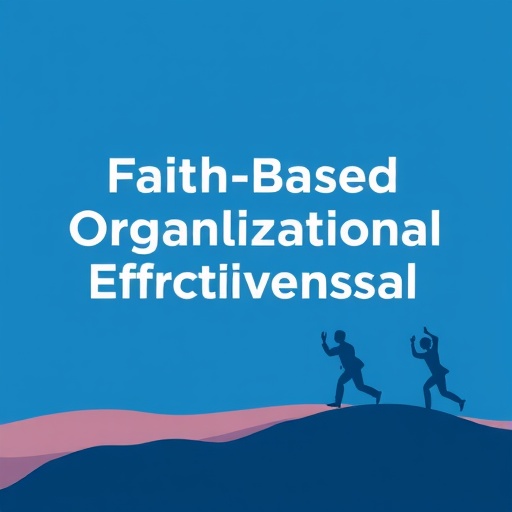In an era where organizational dynamics and effectiveness are paramount, the nexus between psychological insights and operational efficacy within faith-based organizations has garnered increasing attention. A recent study conducted by Nyako Jnr and Mahapatra titled “Phase one preliminary validation of a psychologically informed scale for faith-based organizational effectiveness” sheds light on this critical area, setting the stage for transformative advancements in how we understand and measure success in these organizations.
Faith-based organizations, which often operate at the intersection of spirituality and community service, face unique challenges. Understanding their effectiveness not only hinges on traditional measures of success, such as financial performance or membership growth, but also on psychological dimensions that include community engagement, support systems, and the overall mental well-being of their stakeholders. The study by Nyako Jnr and Mahapatra aims to develop a robust, psychologically informed scale that can accurately capture these nuances, thereby providing faith-based organizations with the tools they need to assess and enhance their effectiveness.
Research in this domain is particularly urgent because many people rely on faith-based communities for social support, as well as spiritual guidance. Yet, the factors contributing to the success or failure of these organizations are often poorly understood. By delving into psychological constructs, the authors propose a framework that seeks to quantify intangible qualities such as empathy, resilience, and collective purpose within faith communities. This novel approach not only expands the boundaries of organizational effectiveness research but also aims to provide actionable insights for leaders within faith-based organizations.
The preliminary validation phase of this scale involved various methodologies designed to ensure its reliability and applicability. Nyako Jnr and Mahapatra employed rigorous statistical techniques to evaluate the scale’s dimensions, ensuring it reflects the real-world complexities of faith-based organizational life. Additionally, the research involved diverse participant groups from various faith traditions to enhance the scale’s universality and ensure that it addresses a range of perspectives and practices. This inclusivity resonates deeply in today’s multicultural societies, highlighting the importance of adaptability in measurement tools.
One of the critical contributions of this research is its basis in psychological theory, specifically its grounding in constructs such as transformational leadership and emotional intelligence. By linking these psychological frameworks to organizational effectiveness, the authors provide a potent theoretical perspective that advocates for a deepened understanding of how leaders can foster environments that nurture both individual and collective growth. The findings suggest that faith-based organizations functioning under transformational leadership styles tend to exhibit higher levels of community involvement, which in turn enhances their overall effectiveness.
Another noteworthy aspect of the study is its implications for training and development within faith leaders. As organizations become increasingly aware of the psychological dimensions influencing their efficacy, there arises a pressing need for educational modules that incorporate these insights into their training programs. Faith leaders equipped with knowledge of psychological principles would be better positioned to foster supportive environments, thus contributing to the health and efficacy of their communities.
The scale’s design and subsequent validation is a crucial step forward in creating a systemized approach to evaluate faith-based institutions. Historically, the lack of quantitative measures often led to anecdotal evidence being considered sufficient. However, Nyako Jnr and Mahapatra’s work shifts that paradigm by offering a scientifically backed tool that can be utilized for benchmarks and comparisons. Organizations will no longer have to rely on gut feelings; they can now measure progress quantitively.
Moreover, the anticipated outcomes of implementing this scale extend beyond individual organizations. As more faith-based entities begin to adopt this tool, there lies the potential for wider systemic changes within the sector. These changes could usher in a new era where collaboration among different faith communities is based on shared metrics of success, thereby fostering inter-organizational partnerships that can address larger societal issues such as poverty, mental health, and community displacement.
Furthermore, the potential for this research to inspire further studies cannot be understated. Researchers in social psychology, organizational studies, and faith-based social sciences are now equipped with a foundation for diving deeper into the intricate dynamics that define religious organizations. By exploring the interplay of psychological factors with organizational outcomes, additional studies could offer fresh perspectives and unexpected insights into this complex landscape.
In an unpredictable world, measuring effectiveness in a manner that resonates with the core values of faith-based organizations is not just beneficial; it is essential. The research provides a framework that goes beyond conventional methods, rooting itself in the very essence of what makes these organizations impactful. The possibility of establishing common grounds for assessing effectiveness also invites a broader discussion about accountability and improvement, further enhancing the appeal of the study.
As organizations increasingly recognize the importance of psychological adeptness in leadership and community development, research such as that by Nyako Jnr and Mahapatra becomes pivotal. The ability to articulate and quantify the psychological factors at play within these organizations ultimately leads them toward a more sustainable and impactful future.
In conclusion, the study presents a pioneering step in cultivating a psychologically informed understanding of faith-based organizational effectiveness. Through the validation of their scale, Nyako Jnr and Mahapatra not only pave the road for future research but also empower faith leaders with invaluable tools for enhancing their impact within communities. The marriage of psychology and organizational theory within the context of faith-Based institutions promises a rich area for further exploration, renewed better practices, and ultimately, a greater societal impact.
Subject of Research: Psychologically informed scale for faith-based organizational effectiveness.
Article Title: Phase one preliminary validation of a psychologically informed scale for faith based organisational effectiveness.
Article References:
Nyako Jnr, A., Mahapatra, R. Phase one preliminary validation of a psychologically informed scale for faith based organisational effectiveness.
Discov Psychol 5, 115 (2025). https://doi.org/10.1007/s44202-025-00483-9
Image Credits: AI Generated
DOI: 10.1007/s44202-025-00483-9
Keywords: Faith-based organizations, organizational effectiveness, psychological scale, community support, transformational leadership, emotional intelligence.




